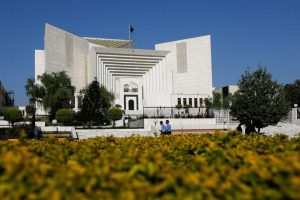The Supreme Court is considering whether or not it should disqualify Members of National Assembly for modifying National Accountability Bureau legislation.
According to the lawyer for the PTI, Justice Shah emphasises that MPs have violated the public trust.

ISLAMABAD: Justice Mansoor Ali Shah of the Supreme Court questioned on Wednesday whether the lawmakers who passed the country’s accountability law amendments had violated the public’s trust and should, therefore, be disqualified under Article 62 1(e) of the Constitution.
The hearing of a petition filed by the leader of the PTI protesting the current administration’s amendments to the National Accountability Ordinance (NAO) 1999 was resumed by a three-judge special bench, led by Chief Justice of Pakistan Umar Ata Bandial and including Justice Ijazul Ahsan and Justice Shah.
While making his case, Imran’s attorney Khawaja Haris stated that the public’s trust was the basis on which governments were established.
He continued by saying that in accordance with Sharia, upholding that trust required the rulers to be accountable.
The attorney added that when leaders hide their actions, the public loses faith in them.
“Under the NAB [National Accountability Bureau] law amendments, giving billions to a third party is no longer a crime,” he maintained.
The PTI chief’s lawyer argued that the property of public officeholders was owned by the public.
He added that the fundamental rights of the people were directly affected by corruption in public property.
Later, the CJP adjourned the hearing by directing Haris to complete his arguments till Thursday (today).
During the previous hearing held a day earlier, Justice Shah observed that no other political party or citizen except the PTI chairman had challenged the recent amendments to the country’s accountability law.
“Why is Imran Khan the only one affected by these amendments out of the country’s 25 million population?” Justice Shah inquired.
Haris while presenting his arguments said that in Islam, there was a command of accountability of government officials.
He further contended that according to Islam, the ruler was responsible for any injustice in the country.
In his plea, the PTI chief had described the amendments as “violative of fundamental rights”.
He further claimed that the changes in the law were made to benefit influential people and legitimise corruption.
He added in the petition that the amendments were aimed at setting aside corruption charges against the president, prime minister, chief ministers and ministers.
Imran further contended in his plea that the changes allowed convicted public office-holders to have their sentences reversed.
The petition contended that most of the amendments were “person-specific” therefore NAB should be asked to provide details of all such cases which were related to prominent and influential holders of public office, especially about the cases pertaining to offences of owning assets beyond known sources of income and misuse of authority.











































